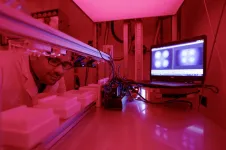Sixth Joint Science Conference of the Western Balkans Process
10 Point Plan to control coronavirus pandemic in the region
2021-07-06
(Press-News.org) Participants at the 6th Joint Science Conference of the Western Balkans Process have developed a "10 Point Plan" to control the coronavirus pandemic in the Western Balkans. Participants at the virtual two-day meeting also discussed priorities for the time after the pandemic in the Western Balkans and South East Europe. These include a decent healthcare system, climate neutrality, reduction of air and water pollution, and the digitalization of education, public administration, industry and healthcare. The conference was jointly organized by the German National Academy of Sciences Leopoldina and the Polish Academy of Sciences as part of the Western Balkans Process.
"We need to identify the lessons learned from this pandemic. The first logical consequence is to strengthen pandemic preparedness and crisis resilience," stated Professor (ETHZ) Dr Gerald Haug, President of the Leopoldina, at the virtual meeting.
In their "10 Point Plan", the participants recommend short-, mid-, and long-term measures for the next two years to control and contain the pandemic in South East Europe and on the European continent: Higher number of vaccines for the Western Balkan countries and accelerated vaccination, pan-European standards for travel and mobility in testing and forgery-proof use of the EU Digital COVID Certificate, and more humanitarian aid from the European Union (EU) as a sign of European solidarity.
The EU funds mobilized for the recovery and resilience of the Western Balkans should be primarily used to create an efficient health care system, to achieve the goal of climate neutrality with an emphasis on reducing air and water pollution, and to digitalize education, public administration, industry and health care. In order to achieve sustainable success, however, investments in education and science (research and innovation) in the Balkans are needed, especially to stop the "brain drain" from South East Europe. Therefore, the conference participants called for the "Western Balkans Research Fund" to be included as a new funding instrument in the EU's Horizon Europe framework programme.
The Western Balkans Process ? also known as the Berlin Process ? is a joint initiative of 16 European countries and the European Commission. It supports the efforts to integrate the region into the European Union and foster regional cooperation. The Process covers areas such as the resolution of bilateral disputes, endorsement of rule of law, connectivity, and economic development as well as strengthening the cooperation in education, science (research and innovation) and inter-societal dialogue. Seventeen parties are currently involved in the Process: Albania, Austria, Bosnia and Herzegovina, Bulgaria, Croatia, France, Germany, Greece, Italy, Kosovo, Montenegro, Northern Macedonia, Poland, Serbia, Slovenia, and the United Kingdom, as well as the European Commission.
INFORMATION:
The "10 Point Plan to Control COVID-19 in the Western Balkans" is available at: http://www.leopoldina.org/en/jsc6
Background information on the Berlin Process and its Joint Science Conference: https://www.leopoldina.org/en/international/science-diplomacy/western-balkans-process/
Information on the Berlin Process and its current German Presidency: http://www.berlinprocess.de
Details on the Western Balkans Research Fund (on the Western Balkans Science Initiative): http://www.leopoldina.org/fileadmin/redaktion/Internationales/overview_wbrf.pdf
The Leopoldina on Twitter: http://www.twitter.com/leopoldina
About the German National Academy of Sciences Leopoldina
As the German National Academy of Sciences, the Leopoldina provides independent science-based policy advice on matters relevant to society. To this end, the Academy develops interdisciplinary statements based on scientific findings. In these publications, options for action are outlined; making decisions, however, is the responsibility of democratically legitimized politicians. The experts who prepare the statements work in a voluntary and unbiased manner. The Leopoldina represents the German scientific community in the international academy dialogue. This includes advising the annual summits of Heads of State and Government of the G7 and G20 countries. With 1,600 members from more than 30 countries, the Leopoldina combines expertise from almost all research areas. Founded in 1652, it was appointed the National Academy of Sciences of Germany in 2008. The Leopoldina is committed to the common good.
Contact:
Lucian Brujan
Senior Officer, Department International Relations and Speaker of the Berlin Process Joint Science Conference
E-Mail: lucian.brujan@leopoldina.org
Media Contact:
Caroline Wichmann
Head of the Press and Public Relations Department
Tel: +49 (0)345 472 39?800
E-Mail: presse@leopoldina.org
ELSE PRESS RELEASES FROM THIS DATE:
2021-07-06
Although hypomorph mammals (or equids) are currently represented by only one genus ('Equus') and just a handful of species of horses, donkeys and zebras, they were more diverse during the Eocene epoch (between 56 and 33.9 million years ago). One of the most widespread groups in Europe, which was an archipelago at that time, were the palaeotheriidae, named after the genus 'Palaeotherium', described in 1804 from fossils originating in the quarries of Montmartre (Paris) by the famous French naturalist George Cuvier.
The international Journal of Vertebrate Paleontology has recently published a paper on a study led by Leire Perales-Gogenola describing two new species of palaeotheriidae mammals that inhabited the subtropical landscape of Zambrana (Álava) ...
2021-07-06
Big hydropower plants are an important source of clean and cheap electricity for many countries in Southeast Asia. However, dams harm the environment and have dire consequences on local communities. Building more dams would therefore pose major trade-offs between electricity supply and environmental protection.
A team of scientists based in Singapore showed that these two challenges can be decoupled. Their study, titled "Solar energy and regional coordination as a feasible alternative to large hydropower in Southeast Asia", recently published in Nature Communications, showed that there are more sustainable pathways to a clean energy future (refer to figure below).
Building on high resolution mathematical models of the Thai, Laotian, and Cambodian ...
2021-07-06
Researchers from Skoltech and the Mental Health Research Center have found 22 lipids in the blood plasma of people with schizophrenia that were associated with lower symptom improvement over time during treatment. These can help track resistance to medication that affects over a third of patients. The paper was published in the journal Biomolecules.
Studies suggest that up to 34% of people living with schizophrenia can be resistant to two or more antipsychotic medications used to treat the disorder. Individual responses vary greatly, and there are no satisfactory biomarkers of treatment response yet, which can often turn finding the right medication into a painful ...
2021-07-06
TAMPA, Fla. (July 6, 2021) - All it takes is three consecutive nights of sleep loss to cause your mental and physical well-being to greatly deteriorate. A new study published in Annals of Behavioral Medicine looked at the consequences of sleeping fewer than six hours for eight consecutive nights - the minimum duration of sleep that experts say is necessary to support optimal health in average adults.
Lead author Soomi Lee, assistant professor in the School of Aging Studies at the University of South Florida, found the biggest jump in symptoms appeared after just one night of sleep loss. The number of mental and physical problems steadily got worse, peaking on day three. At that point, research shows the human body got relatively used to repeated sleep loss. But that all ...
2021-07-06
Announcing a new article publication for BIO Integration journal. In this article the authors Daowei Lin, Zhixiao Han, Yanni Fu, Xiaoqiu Zhu, Jin Li, Hui Xu, Jing Wen, Fei Wang and Mingyan Guo from Sun Yat-sen University, Guangdong, China, The First Affiliated Hospital of Zhengzhou University, Zhengzhou, Henan, China and University of Virginia, Charlottesville, VA, USA discuss how interscalene brachial plexus block combined with general anesthesia attenuates stress and inflammatory response in arthroscopic shoulder surgery.
In arthroscopic shoulder surgery, general ...
2021-07-06
Singapore, 7 July 2021 - In 1966, The Beatles cemented the plight of lonely older people in the popular imagination with the iconic 'Eleanor Rigby', a song that turned pop music on its head when it stayed at number one on the British charts for four weeks. Today, the impact of loneliness in old age on life and health expectancy has been categorically quantified for the first time in a study by scientists at Duke-NUS Medical School (Singapore), Nihon University (Tokyo, Japan) and their collaborators, published in the Journal of the American Geriatrics Society.
"We found that lonely older adults can expect to live a shorter life than their peers who don't perceive themselves as ...
2021-07-06
Announcing a new article publication for BIO Integration journal. In this article the authors Xiao'en Shi, Xu Zhang, Xinlu Zhang, Haizhen Guo and Sheng Wang from Tianjin University, Tianjin, China discuss the integration of reactive oxygen species generation and prodrug activation for cancer therapy.
The combination of chemotherapeutic drugs and reactive oxygen species (ROS) can improve cancer treatment outcome. Many ROS-generation strategies can specifically consume tumor-inherent oxygen and generate ROS, resulting in amplified ROS level and aggravated hypoxia. Therefore, the ROS generation strategy can integrate with prodrug activation strategy to realize synergetic therapy.
In recent years, stimuli-responsive nanomedicines have ...
2021-07-06
Historically most scientists thought that once a satellite galaxy has passed close by its higher mass parent galaxy its star formation would stop because the larger galaxy would remove the gas from it, leaving it shorn of the material it would need to make new stars. However, for the first time, a team led by the researcher at the Instituto de Astrofísica de Canarias (IAC), Arianna di Cintio, has shown using numerical simulations that this is not always the case. The results of the study were recently published in the journal Monthly Notices of the Royal Astronomical Society (MNRAS).
Using sophisticated simulations of the whole of the Local Group of galaxies, including the Milky Way, the Andromeda galaxy and their respective satellite ...
2021-07-06
By analyzing the genomes of 99 species of vinegar flies and evaluating their chemical odor profiles and sexual behaviors, researchers at the Max Planck Institute for Chemical Ecology show that sex pheromones and the corresponding olfactory channels in the insect brain evolve rapidly and independently. Female flies are able to recognize conspecific males through their specific odor profiles. Interestingly, closely related species show distinct differences in odor profiles, which helps to prevent mating between different species. Males, in turn, chemically mark females during mating so that they become less attractive to other males. The ...
2021-07-06
July 6, 2021 - Traumatic brain injury (TBI) has a major impact on the lives of affected patients and families. But it doesn't necessarily lead to an increased risk of marital instability, as two-thirds of patients with TBI are still married to the same partner 10 years after their injury, reports a study in the July/August issue of the Journal of Head Trauma Rehabilitation (JHTR). The official journal of the Brain Injury Association of America, JHTR is published in the Lippincott portfolio by Wolters Kluwer.
For marriages that do end, divorce most often occurs within the first year after TBI, according to the new research by Flora M. Hammond, MD, of Indiana University School of Medicine, Indianapolis, and colleagues. "Our data dispel ...
LAST 30 PRESS RELEASES:
[Press-News.org] Sixth Joint Science Conference of the Western Balkans Process
10 Point Plan to control coronavirus pandemic in the region



